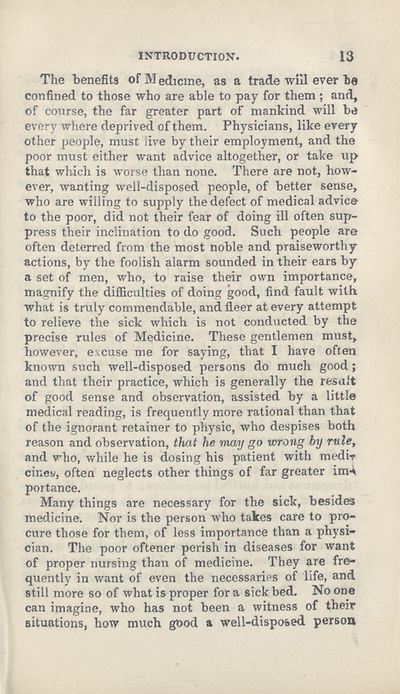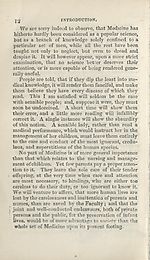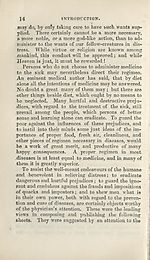Diseases > Domestic medicine
(47)
Download files
Complete book:
Individual page:
Thumbnail gallery: Grid view | List view

INTRODUCTION.
13
The benefits of M edicme, as a trade wiU ever be
confined to those who are able to pay for them ; and,
of conrse, the far greater part of mankind will be
every where deprived of them. Physicians, like every
other people, must live by their employment, and the
poor must either want advice altogether, or take up
that which is worse than none. There are not, how¬
ever, wanting well-disposed people, of better sense,
who are willing to supply the defect of medical advice
to the poor, did not their fear of doing ill often sup¬
press their inclination to do good. Such people are
often deterred from the most noble and praiseworthy-
actions, by the foolish alarm sounded in their ears by
a set of men, who, to raise their own importance,
magnify the difficulties of doing good, find fault with
what is truly commendable, and fleer at every attempt
to relieve the sick which is not conducted by the
precise rules of Medicine. These gentlemen must,
however, excuse me for saying, that I have often
known such well-disposed persons do much good;
and that their practice, which is generally the result
of good sense and observation, assisted by a little
medical reading, is frequently more rational than that
of the ignorant retainer to physic, who despises both
reason and observation, that he may go wrong by rule,
and who, while he is dosing his patient with mediv
cines, often neglects other things of far greater im-i
portance.
Many things are necessary for the sick, besides
medicine. Nor is the person who takes care to pro¬
cure those for them, of less importance than a physi¬
cian. The poor oftener perish in diseases for want
of proper nursing than of medicine. They are fre¬
quently in want of even the necessaries of life, and
still more so of what is proper for a sick bed. No one
can imagine, who has not been a witness of their
situations, how much good a well-disposed person
13
The benefits of M edicme, as a trade wiU ever be
confined to those who are able to pay for them ; and,
of conrse, the far greater part of mankind will be
every where deprived of them. Physicians, like every
other people, must live by their employment, and the
poor must either want advice altogether, or take up
that which is worse than none. There are not, how¬
ever, wanting well-disposed people, of better sense,
who are willing to supply the defect of medical advice
to the poor, did not their fear of doing ill often sup¬
press their inclination to do good. Such people are
often deterred from the most noble and praiseworthy-
actions, by the foolish alarm sounded in their ears by
a set of men, who, to raise their own importance,
magnify the difficulties of doing good, find fault with
what is truly commendable, and fleer at every attempt
to relieve the sick which is not conducted by the
precise rules of Medicine. These gentlemen must,
however, excuse me for saying, that I have often
known such well-disposed persons do much good;
and that their practice, which is generally the result
of good sense and observation, assisted by a little
medical reading, is frequently more rational than that
of the ignorant retainer to physic, who despises both
reason and observation, that he may go wrong by rule,
and who, while he is dosing his patient with mediv
cines, often neglects other things of far greater im-i
portance.
Many things are necessary for the sick, besides
medicine. Nor is the person who takes care to pro¬
cure those for them, of less importance than a physi¬
cian. The poor oftener perish in diseases for want
of proper nursing than of medicine. They are fre¬
quently in want of even the necessaries of life, and
still more so of what is proper for a sick bed. No one
can imagine, who has not been a witness of their
situations, how much good a well-disposed person
Set display mode to:
![]() Universal Viewer |
Universal Viewer | ![]() Mirador |
Large image | Transcription
Mirador |
Large image | Transcription
| Antiquarian books of Scotland > Diseases > Domestic medicine > (47) |
|---|
| Permanent URL | https://digital.nls.uk/119888706 |
|---|
| Description | Thousands of printed books from the Antiquarian Books of Scotland collection which dates from 1641 to the 1980s. The collection consists of 14,800 books which were published in Scotland or have a Scottish connection, e.g. through the author, printer or owner. Subjects covered include sport, education, diseases, adventure, occupations, Jacobites, politics and religion. Among the 29 languages represented are English, Gaelic, Italian, French, Russian and Swedish. |
|---|

